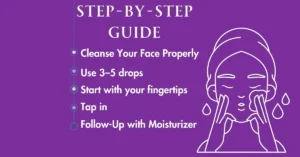If I answer it in short that is “Yes, face serums are great for dry skin as they provide deep hydration and nourishment, especially those with ingredients like hyaluronic acid and glycerin.”
And if you wanna know in-depth,,,,,, Let’s jump now 🙂
In this post, we’ll explore how face serums work, which ingredients to look for, and how they can be the solution your skin’s been craving. Keep reading to find out how to tackle dryness once and for all!
Dry skin can feel like a constant battle—tightness, flakiness, irritation. No one wants to deal with that, right? But here’s the thing: face serums could be your secret weapon in the fight against dry skin. In this article, we’ll break down everything you need to know about face serums and why they might just be the missing piece in your skincare routine.
What Is Dry Skin?
Before diving into serums, let’s get clear on what dry skin actually is. Dry skin happens when your skin can’t hold onto enough moisture. It can feel tight, rough, and flaky. In some cases, it can even crack and cause irritation. So, what causes dry skin?
- Weather: Winter air is notoriously dry and strips moisture from your skin. Even air conditioning or heating in the summer can do the same.
- Dehydration: If you’re not drinking enough water, your skin might show the signs.
- Aging: As we get older, our skin produces less natural oils, which can lead to dryness.
- Skin conditions: Eczema and psoriasis are common culprits behind super dry skin.
Important note: First of all sorry to disturb in your reading, but if you wanna know which products are good specifically for dry skin. Let’s check our article on Best face serums for dry skin then Google it!
Why Does Dry Skin Need Special Care?
You might think that slapping on any moisturizer will do the job, but dry skin needs more than just a quick fix. It needs hydration—and it needs something to lock that moisture in.
Your skin’s barrier is key. It’s like a brick wall that keeps moisture in and irritants out. But when it’s damaged, your skin struggles to keep moisture in, which leads to dryness. That’s why products like face serums can be so effective—they target specific skin needs, helping to strengthen that skin barrier and give your skin the hydration it craves.
What Is a Face Serum?
A face serum is a lightweight, concentrated liquid that targets specific skin issues. Unlike a moisturizer, which sits on top of the skin, serums penetrate deeper layers. They’re packed with active ingredients designed to give your skin that extra boost.
Serums aren’t the same as facial oils or moisturizers. While oils are great for adding moisture to the skin’s surface, serums target deeper skin layers for more profound hydration and repair. Think of it like a treatment—similar to how you’d apply medicine for a cold, only this time, it’s for your skin.
How Face Serums Benefit Dry Skin
So, how do these serums actually help dry skin? Let’s break it down.
1. Deep Hydration
Some of the most common ingredients in face serums—like Hyaluronic Acid and Glycerin—are all about attracting moisture to your skin. These ingredients work like magnets, drawing moisture from the air and into your skin, helping it feel plump and hydrated.
- Hyaluronic Acid: This superstar ingredient holds 1,000 times its weight in water. It’s like a tall glass of water for your skin!
- Glycerin: Another powerhouse that pulls water from the environment, keeping your skin hydrated and smooth.
2. Strengthening the Skin Barrier
A healthy skin barrier is vital for dry skin. Without it, moisture escapes, and irritants creep in. That’s where ingredients like Ceramides and Niacinamide come in. They help restore the skin barrier, keeping the good stuff in and the bad stuff out.
- Ceramides: These natural lipids (fats) act like the bricks in your skin’s protective wall, locking in moisture.
- Niacinamide: Also known as Vitamin B3, niacinamide helps strengthen the skin barrier while calming inflammation and redness.
3. Repairing and Soothing Irritated Skin
Dry skin often leads to irritation and redness. Ingredients like Centella Asiatica and Panthenol help calm and repair damaged skin.
- Centella Asiatica (Cica): This herb is famous for its soothing properties. It helps heal dry, irritated skin and promotes skin regeneration.
- Panthenol (Vitamin B5): A gentle hydrator that also helps soothe and heal your skin, especially when it’s feeling raw and irritated.
4. Restoring Moisture and Preventing Future Dryness
Not only do serums hydrate your skin now, but they help prevent dryness in the future by improving moisture retention. For example, Peptides and Squalane help maintain your skin’s moisture balance.
- Peptides: These tiny proteins help rebuild the skin’s moisture barrier, keeping your skin soft and plump.
- Squalane: This oil works to lock in moisture and prevent it from escaping throughout the day.
Top Ingredients for Dry Skin
Here’s a quick look at the best ingredients to look for in face serums if you have dry skin:
- Hyaluronic Acid: For hydration.
- Niacinamide: To calm inflammation and strengthen your skin’s barrier.
- Ceramides: For restoring moisture.
- Squalane: To lock in moisture.
- Panthenol/Vitamin B5: To soothe and hydrate.
- Peptides: To support skin repair.
- Centella Asiatica: To heal and soothe irritated skin.
Choosing the Right Face Serum for Dry Skin
Not all face serums are created equal. You need to pick the one that works for your skin’s specific needs. Let’s break it down:
1. Understanding Your Skin’s Needs
First, identify whether your skin is just dry, or if it’s also sensitive or dehydrated. If your skin is extremely dry and flaky, you’ll want a serum that focuses on intense hydration. If your skin is also inflamed or irritated, look for serums with soothing ingredients like Centella Asiatica or Niacinamide.
2. How to Read Ingredient Labels
When shopping for a serum, check the ingredient list for hydrating and soothing ingredients. Look for products with a mix of humectants (like Hyaluronic Acid and Glycerin), emollients (like Squalane and Ceramides), and anti-inflammatory agents (like Niacinamide and Cica).
3. Best Serums for Dry Skin
Here are a few serums that are great for tackling dry skin:
- Glow Recipe Watermelon Serum: Packed with hydration, this one’s perfect for dry skin.
- Tatcha Dewy Skin Serum: A great choice for moisture and that healthy glow.
- La Mer The Revitalizing Hydrating Serum: A luxury pick that deeply nourishes and hydrates.
- Vichy Minéral 89 Hyaluronic Acid Serum: A skin-strengthening serum with a focus on hydration.
How to Use a Face Serum for Dry Skin
You might be thinking, “Okay, I’ve got my serum, now what?”
1. Application Tips
Serum is usually applied after cleansing but before moisturizing. That’s because serums are concentrated, and you want your skin to absorb all those powerful ingredients without anything getting in the way.
- How much to use: A little goes a long way. Start with a few drops, then gently press it into your skin.
2. Layering with Other Products
Once your serum has soaked in, follow up with your favorite moisturizer to lock in all that hydration. You can also add facial oil if you need extra moisture.
3. Patch Testing
Before slathering on a new serum, always do a patch test to avoid any irritation. Simply apply a small amount to a discreet part of your skin (like behind your ear) and wait 24 hours. If you don’t experience any redness or irritation, go ahead and use it!
The Role of Face Serums in a Skincare Routine
Face serums play a crucial role in your skincare routine, but they don’t do everything. Serums + Moisturizers = Better Hydration. A serum boosts hydration, and a good moisturizer locks it in.
And let’s not forget SPF! No matter how hydrating your serum is, always apply sunscreen during the day. It’s essential for protecting your skin from UV damage.
What Dermatologists Say About Face Serums for Dry Skin
Experts agree—serums are a great addition to a dry skin routine. Dr. Viera and Dr. Bowles both recommend serums with Hyaluronic Acid and Ceramides to boost hydration and improve skin’s barrier function. Clinical studies also show that ingredients like Niacinamide and Peptides are effective at soothing inflammation and improving skin texture.
Common Concerns and Myths About Face Serums
1. Do Face Serums Make Dry Skin Worse?
Nope! As long as you’re choosing the right serum for your skin’s needs, serums are designed to help—not hurt. Just avoid products with harsh ingredients like Retinol or Exfoliating Acids unless you’re used to them.
2. Are Expensive Serums Worth It?
The price doesn’t always equal the quality. While luxury brands like La Mer and Tatcha can be amazing, you’ll find plenty of affordable serums that work just as well—like the Glow Recipe Watermelon Serum.
3. Can You Use Serums for Eczema or Psoriasis?
If you have eczema or psoriasis, always consult a dermatologist before trying new products. However, many people find serums with soothing ingredients like Centella Asiatica or Panthenol to be helpful for calming flare-ups.
Conclusion: Is Face Serum Good for Dry Skin?
Absolutely! Face serums can be a game-changer for dry skin. They provide deep hydration, help repair the skin barrier, and soothe irritation. Just remember to choose a serum with the right ingredients, apply it correctly, and layer it with a good moisturizer. With the right routine, your dry skin will be looking and feeling better in no time!
FAQs: Common Questions About Face Serums for Dry Skin

- Can I use a serum instead of a moisturizer for dry skin?
No, serums work best as a supplement to your moisturizer. They’re concentrated, but you’ll still need a moisturizer to lock in the hydration. - How long does it take to see results from a hydrating serum?
You should start noticing smoother, more hydrated skin within a few days to a week. - Are there any side effects of using face serums?
It’s rare, but some serums can cause irritation. Always patch-test first and avoid products with harsh ingredients if you have sensitive skin.
Let’s face it, dry skin isn’t fun, but with the right face serum, you can give your skin the hydration and care it truly needs. Happy skincare!


